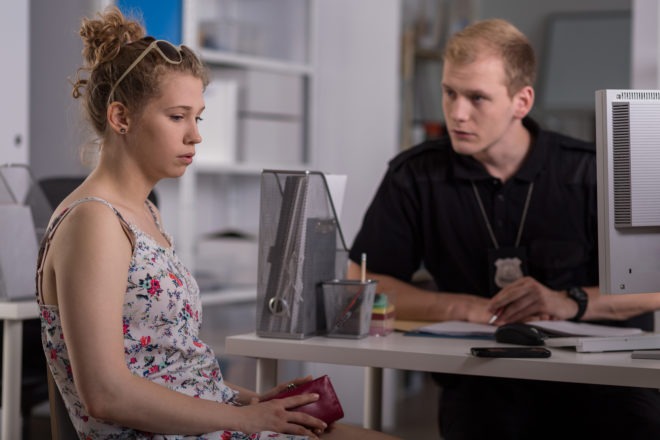

Call Attorney Marni Jo Snyder 24 Hours / 7 Days:
215.515.3360
Some people may be surprised to find out that police can lie to you during a stop, interrogation, or other parts of their investigation. This makes it even more important to know your rights, to know when you can walk away from a police officer, and to know that having an attorney present is always helpful.
Police can use lies to get you to confess to something you may or may not have done, and ultimately use this information to try to get a guilty plea or ultimately a conviction for a crime. The courts have decided that police can use lying as a tactic to get the unsuspecting person to say that they have done something.
Whether you have admitted to something or not, having an attorney every step of the way for a criminal case in Pennsylvania to zealously advocate on your behalf is essential. At the Law Offices of M.J. Snyder, LLC, we have extensive experience with all kinds of criminal matters, and will be there with you as you deal with the difficult process of facing charges.
For a free legal consultation, call 215.515.3360
There is a common idea that police who are working undercover have to identify themselves to you as police officers. For officers who are undercover, they will not have to identify themselves as police and, thereby, can get you to have more open conversations or trust them in a way that you would not when speaking with an officer in uniform. Just because an officer says they are not an officer, this is not necessarily true. So do not trust someone just because they tell you they are not law enforcement.
Generally, police use many tactics to get you to make admissions that hurt you and your case. They tell you not to consult a lawyer, which is always problematic, because having your lawyer there protects you and gives you someone who knows the law to represent you.
Police will offer you many things that may not even be on the table. This is a strategy designed to get you to tell them information, names, dates, and anything else that can be used against you by the prosecutor to either secure a guilty plea or conviction. Police do not determine the outcome of a case in court. Sometimes they may comment to a judge as to whether you were polite during your interactions, but they CANNOT make a big deal about you remaining silent. Do not believe them when they tell you that they can get you a good outcome on a case. Please be polite and ask for an attorney until they get you one.
Police can make up evidence or make up things that they claim other people you know might have said. They can fabricate that they found your DNA or fingerprints at the scene, but these things actually take a while to process.
While unfair, these are tactics police can use to try to get you to say you committed a crime, and they do it in a stressful environment full of pressure and anxiety.
Talking to the police can often hurt you. You do not want to give up any rights before speaking to a lawyer and speaking to the police is actually giving up your right to remain silent. Therefore emphasizing the benefits of talking with them – and maybe making admissions – is one of the most important lies police can engage in. Last, if someone wants to share information, it is critical that their attorney be present to help counsel them on what to say and when to get the best deal possible. Having an attorney there the whole time is essential, even – and perhaps especially – if you know you are innocent.
The main protection you have is that police must obey the “Miranda” warnings rule, which requires them to tell you about your rights, such as the right to counsel, in certain circumstances, like when you are under arrest and they want to question you or use what you say against you.
However, if they do this, it does not limit their ability to get you to confess in other ways as described above. Ultimately, having an experienced, competent attorney with you from the moment you are arrested through negotiations and trial is extremely important in all kinds of criminal cases.
At the Law Offices of M.J. Snyder, LLC, we know Pennsylvania criminal law, and can help you right from the moment you are under investigation or facing criminal charges. Criminal accusations are extremely intimidating, and police might use a number of tactics to get you to confess. Our attorneys at the Law Offices of M.J. Snyder, LLC will fight for you every step of the way. We are here to protect you, and try to obtain the best result possible. Contact us today at 215-515-3360!
Call 24/7: 215.515.3360
Email: info@snyderlawyer.com
Fax: 215-376-6981
This website is for general informational purposes only. The act of sending an e-mail to the Firm or any attorney at the Firm, or submitting a form response or other materials through the website, will not create an attorney-client relationship. The only way to create an attorney-client relationship with the Firm is through a written agreement.Read More